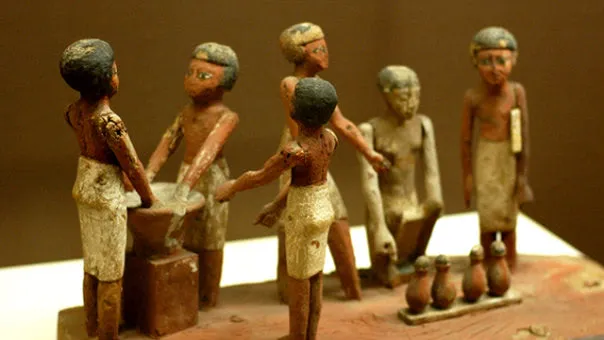Psychiatrist Jeffrey P. Kahn believes that beer, far from being an agent of late-night chaos and early morning regrets, is what gave our ancestors modern civilization. Beer, he writes, triggered the leap from rule-bound hunter-gather groups into the creative, complex societies we've been enjoying for the last 10,000 years. Is there some truth in this statement, or is it no more solid than a foamy head of ale?
There's some evidence to back up his claims. Grain may have been domesticated to satisfy our craving for alcohol rather than for bread. In fact, brewing does appear to predate baking by 3,000 years. There's no doubt that dense towns and cities flourished on fermented beverages when plain water was too dangerous to drink. And, as Guinness likes to point out, beer has certain nutritional benefits, not to mention that it's high in calories. People beset by periodic famines probably didn't mind socking away some extra fat in a beer gut.
Kahn, however, argues that beer and wine were not just disease-free sources of hydration or easy ways to store excess food, but that they played a foundational role in the development of the modern, civilized mind. What Kahn identifies as humanity's five core social tendencies – codependence on our tribe members, hierarchy, responsibility, fear of offending others, and conveniently dying when we get too old to be of use – were so effective at keeping group members in line they effectively squelched creative expression. According to Kahn, humans needed booze to break the chains of our social instincts and free us to become more expressive, creative, and experimental. No beer, no art. No wine, no democracy. But is tipple really that vital, or is something even deeper at play?
Kahn's argument discounts the many hunter-gather tribes that regularly brew and drink fermented beverages, or the many individuals and societies that function just fine without the hard stuff. If the historical record is anything to go by, the wildly expressive paintings in the Chauvet Cave show that humans have possessed powerful artistic imaginations for at least 30,000 years – presumably no beer or wine required.
Although not all humans drink, all humans do appear to share a lust for intoxication – whether they achieve it through drugs, dancing, chanting, prayer, or scaling mountains to see visions of God in the oxygen-deprived heights. Along with food, sex and sleep, the urge for non-normal mental states has been theorized to be a fourth universal human drive. Intoxication can make us more creative, as Kahn points out, but it can also bring us deeper into codependence with our tribe members through shared, intense emotion and the affirmation of whatever deity we choose to believe in.
It's unlikely that alcohol played a singular role in the development of modern civilization. Rather, our love of altered states could have been one of the nudges that pushed us into being fully, mentally human. Or, it could be that pubs, religious trances and all-night raves are just a side effect of having exceptionally large, curious minds that hunger for novel stimulus. Either way, the next round's on evolution.
Read Kahn's full article at The New York Times.


Comments (0)
Share your thoughts and join the technology debate!
No comments yet
Be the first to share your thoughts!